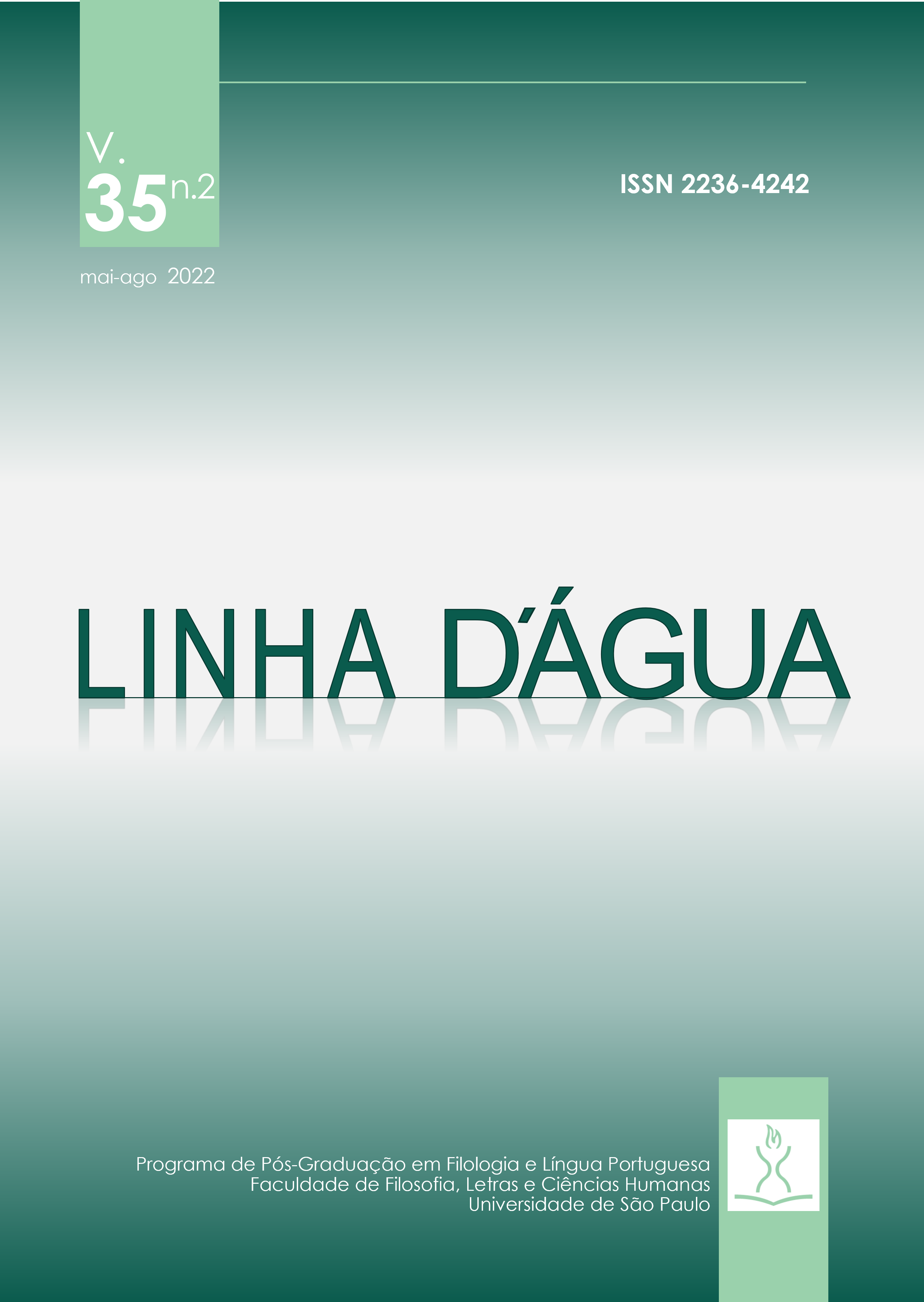Tipologia de expressões cristalizadas verbais do espanhol peninsular: um estudo preliminar e comparado
DOI:
https://doi.org/10.11606/issn.2236-4242.v35i2p160-173Palabras clave:
Fraseologia , Léxico-gramática , Sintaxe , Análise comparada, Língua espanholaResumen
Este trabalho apresenta os resultados de um estudo piloto do comportamento sintático-semântico de expressões cristalizadas verbais (ECV) do espanhol peninsular (ESP), como “perderse la cabeza”, tendo como base a tipologia proposta por Vale (2002) para as ECV do português brasileiro (PB). Além disso, estabelece-se uma comparação preliminar entre expressões cristalizadas do ESP e seus equivalentes semelhantes do PB. Para o desenvolvimento da pesquisa, foram analisadas e classificadas 20 ECV do ESP em 5 classes distintas, segundo suas propriedades sintático-semânticas. Com isso, ao final da análise, pôde-se concluir que: (i) as expressões selecionadas apresentam um comportamento léxico-sintático-semântico semelhante nos dois idiomas; e (ii) determinados comportamentos de construções verbais livres se conservam nas expressões cristalizadas constituídas pelo mesmo verbo: em língua espanhola, por exemplo, verificou-se a seleção da preposição a na introdução de complementos humanos ou humanizados, e a maior incidência de expressões com verbos reflexivos.
Descargas
Referencias
BARROS, C. D. Descrição e classificação de predicados nominais com o verbo-suporte fazer no Português do Brasil. Tese (Doutorado em Linguística). Universidade Federal de São Carlos, São Carlos, 2014. Disponível em: https://repositorio.ufscar.br/handle/ufscar/5632?show=full. Acesso em outubro de 2021.
BELANDO, M. G. Considerações sobre o clítico se em construções médias com os verbos espanhóis matar e morir. Caracol, [S. l.], n. 19, p. 394-425, 2020. DOI: http://doi.org/10.11606/issn.2317-9651.v0i19p394-425.
DI TULLIO, A.; MALCUORI, M. Gramática del español para maestros y profesores del Uruguay. 1. ed. Montevideo: ANEP. ProLEE, 2012.
GROSS, M. Méthodes en syntaxe. Régime des constructions complétives. Paris: Hermann, 1975.
GROSS, M. Une classification des phrases figées du français. Revue québécoise de linguistique, v. 11, n. 2, p. 151 – 185, 1982. DOI: https://doi.org/10.7202/602492ar.
NOIMANN, A. Proposta de dicionário de regência verbal português/espanhol para aprendizes brasileiros de espanhol. Tese (Doutorado em Teorias Linguísticas do Léxico). Universidade Federal do Rio Grande do Sul, Porto Alegre, 2015. Disponível em: https://www.lume.ufrgs.br/handle/10183/117590. Acesso em outubro de 2021.
RAMMÉ, V.; RODRIGUEZ, D. G. V. O uso da preposição ‘a’ como objeto direto (OD) e objeto indireto (OI): uma análise contrastiva entre o espanhol e o português brasileiro. Caletroscópio, v. 8, n. Especial II, p. 103, 126, 2020. Disponível em: https://periodicos.ufop.br/caletroscopio/article/view/3890.
RANCHHOD, E. M. O lugar das expressões ‘fixas’ na gramática do Português. In: CASTRO, I.; DUARTE, I. (eds.). Razão e Emoção. Lisboa: INCM, p. 239-254, 2003.
REIS, S. M. M. A correspondência entre provérbios e expressões fixas no português europeu. Dissertação (Mestrado em Ciências da Linguagem). Universidade do Algarve, Faro, 2014. Disponível em: https://sapientia.ualg.pt/handle/10400.1/6900. Acesso em outubro de 2021.
RODRIGUES, R.; VALE, O. A.; BAPTISTA, J. Relações formais entre expressões cristalizadas e as construções verbais locativas livres. Revista do GELNE, [S. l.], v. 21, n. 1, p. 47–62, 2019. DOI: http://doi.org/10.21680/1517-7874.2019v21n1ID16055.
SILVA, L. L. O. El abrazo de las palabras: estudio contrastivo entre las expresiones fijas de la lengua portuguesa de Brasil y sus equivalencias en la lengua española de España. Tese (Doutorado em Custiones de la Lengua), Universidad de Salamanca, Salamanca, 2013.
TERMIGNONI, S.; FINATTO, M. J. B. Sobre a importância de ensinar expressões idiomáticas. Revista de Italianística, [S. l.], n. 35, p. 112-124, 2017. DOI: http://doi.org/10.11606/issn.2238-8281.v0i35p112-124.
VALE, O. A. Expressões cristalizadas: transparência e opacidade. Signótica, Goiânia, v. 11, n. 1, p. 163–172, 2009. DOI: http://doi.org/10.5216/sig.v11i1.7282.
VALE, O. A. Expressões cristalizadas do português do Brasil: uma proposta de tipologia. Tese (Doutorado em Letras). Universidade Estadual Júlio Mesquita Filho, Araraquara, 2002.
VILLAVICENCIO, A. et al;. Identificação de Expressões Multipalavra em Domínios Específicos. Linguamática, v. 2, n. 1, p. 15-33, 7 Abr. 2010. Disponível em: https://linguamatica.com/index.php/linguamatica/article/view/43.
Descargas
Publicado
Número
Sección
Licencia
Derechos de autor 2022 Maria Caroline dos Santos Fonseca, Roana Rodrigues

Esta obra está bajo una licencia internacional Creative Commons Atribución-NoComercial 4.0.
A aprovação dos manuscritos implica cessão imediata e sem ônus dos direitos de publicação para a Linha D'Água. Os direitos autorais dos artigos publicados pertencem à instituição a qual a revista encontra-se vinculada. Em relação à disponibilidade dos conteúdos, a Linha D'Água adota a Licença Creative Commons, CC BY-NC Atribuição não comercial. Com essa licença é permitido acessar, baixar (download), copiar, imprimir, compartilhar, reutilizar e distribuir os artigos, desde que para uso não comercial e com a citação da fonte, conferindo os devidos créditos autorais à revista.
Nesses casos, em conformidade com a política de acesso livre e universal aos conteúdos, nenhuma permissão é necessária por parte dos autores ou do Editor. Em quaisquer outras situações a reprodução total ou parcial dos artigos da Linha D'Água em outras publicações, por quaisquer meios, para quaisquer outros fins que sejam natureza comercial, está condicionada à autorização por escrito do Editor.
Reproduções parciais de artigos (resumo, abstract, resumen, partes do texto que excedam 500 palavras, tabelas, figuras e outras ilustrações) requerem permissão por escrito dos detentores dos direitos autorais.
Reprodução parcial de outras publicações
Citações com mais de 500 palavras, reprodução de uma ou mais figuras, tabelas ou outras ilustrações devem ter permissão escrita do detentor dos direitos autorais do trabalho original para a reprodução especificada na revista Linha D'Água. A permissão deve ser endereçada ao autor do manuscrito submetido. Os direitos obtidos secundariamente não serão repassados em nenhuma circunstância.











